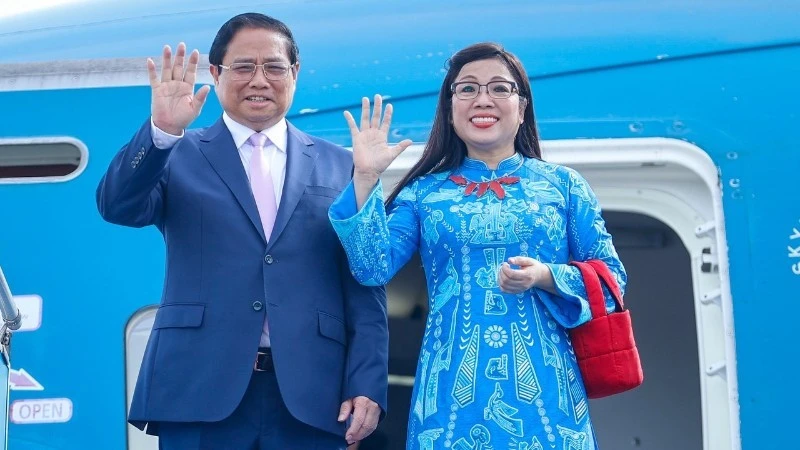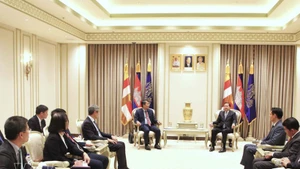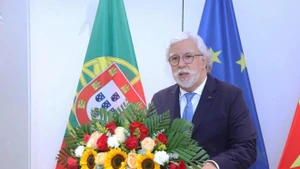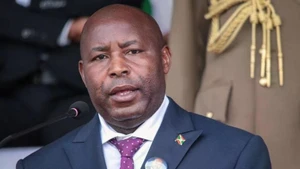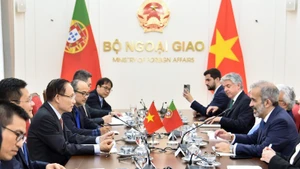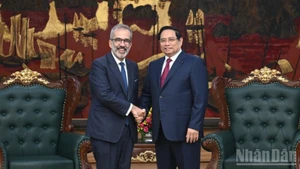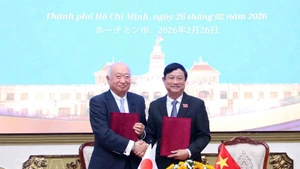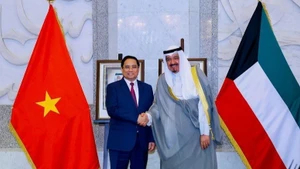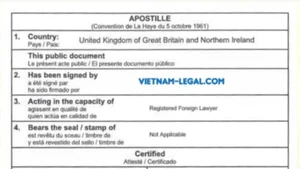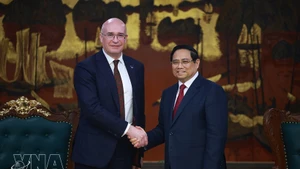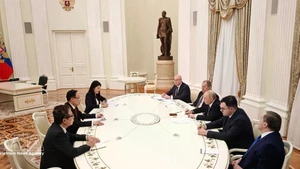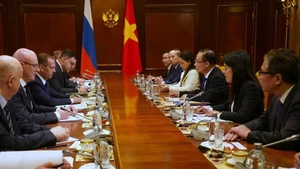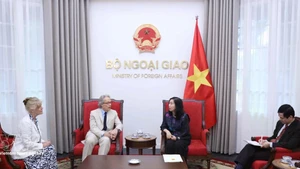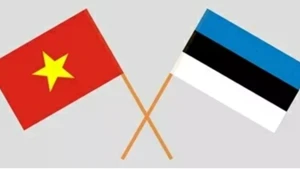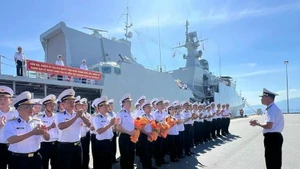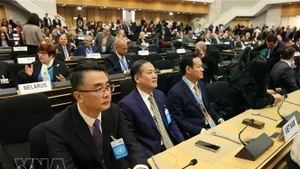At the invitation of Sheikh Ahmad Abdullah Al-Ahmad Al Sabah, Prime Minister of the State of Kuwait, Pham Minh Chinh, Prime Minister of the Socialist Republic of Viet Nam, along with his spouse and a high-ranking Vietnamese delegation, will pay an official visit to Kuwait from November 16 to November 18. On the occasion, Vietnamese Ambassador to Kuwait Nguyen Duc Thang shared with a reporter from Nhan Dan Newspaper about the significance of the visit and the prospects of Viet Nam–Kuwait bilateral relations.
Elevating Viet Nam–Kuwait relations to a new level
According to Ambassador Nguyen Duc Thang, the official visit to Kuwait by Prime Minister Pham Minh Chinh carries great significance, not only for bilateral relations between Viet Nam and Kuwait but also at the regional level in affirming Viet Nam’s foreign policy.
This diplomatic activity follows the prime minister’s trip to three Gulf states in 2024, demonstrating Viet Nam’s resolve to implement its foreign policy strategy towards the Middle East and promptly materialise Resolution 59-NQ/TW on international integration in the new context. Through high-level external activities, Viet Nam continues to consolidate friendship ties, strengthen political trust, expand markets, and explore areas of cooperation with Kuwait where much potential remains untapped.
The official visit to Kuwait by Prime Minister Pham Minh Chinh carries great significance, not only for bilateral relations between Viet Nam and Kuwait but also in affirming Viet Nam’s foreign policy towards the entire region.
Vietnamese Ambassador to Kuwait Nguyen Duc Thang
Ambassador Nguyen Duc Thang emphasised that Prime Minister Pham Minh Chinh’s visit is the first by a high-ranking Vietnamese leader to Kuwait in 16 years and takes place at a time in which the two countries are preparing to celebrate the 50th anniversary of their establishment of diplomatic relations in January 2026.
According to Ambassador Nguyen Duc Thang, this is a ripe moment for both sides to strengthen and enhance bilateral relations, elevating them to a new level and contributing meaningfully to the development goals of both countries. For Viet Nam, these include becoming a developing nation with modern industry and one of the world’s top 30 economies by 2030, striving to become a developed, high-income, prosperous, and happy nation by 2045. For Kuwait, it is the “Vision 2035” plan to transform the country into a leading financial and commercial centre in the region and globally.
Furthermore, the visit takes place as Kuwait is serving as Chair of the Gulf Cooperation Council (GCC). In recent years, Kuwait has adjusted its policies and paid greater attention to Asian partners, including ASEAN member states. Kuwait proactively signed the Treaty of Amity and Cooperation in Southeast Asia (TAC) in September 2023. At two recent GCC–ASEAN summits (in October 2023 and May 2025), Kuwait played an active role and contributed to many important cooperation issues between the two blocs.
Given their full potential and positions, Viet Nam and Kuwait can serve as bridges in the promotion of inter-regional cooperation between ASEAN and the GCC. Viet Nam also hopes Kuwait will play an active role in encouraging the launch of negotiations for a Free Trade Agreement (FTA) between Viet Nam and the GCC in 2025.
Sharing information on the visit’s agenda, Ambassador Nguyen Duc Thang said Prime Minister Pham Minh Chinh will engage in a series of important activities, including an audience with Emir Sheikh Meshal Al-Ahmad Al-Jaber Al-Sabah and Crown Prince Sheikh Sabah Al-Khaled Al-Hamad Al-Sabah; official talks with Kuwaiti Prime Minister Sheikh Ahmad Al-Abdullah Al-Ahmad Al-Sabah; and meetings with several ministers and leaders of major economic conglomerates. Both sides will review nearly half a century of friendship and cooperation and discuss directions, measures, and frameworks for deeper and broader cooperation in the coming period.
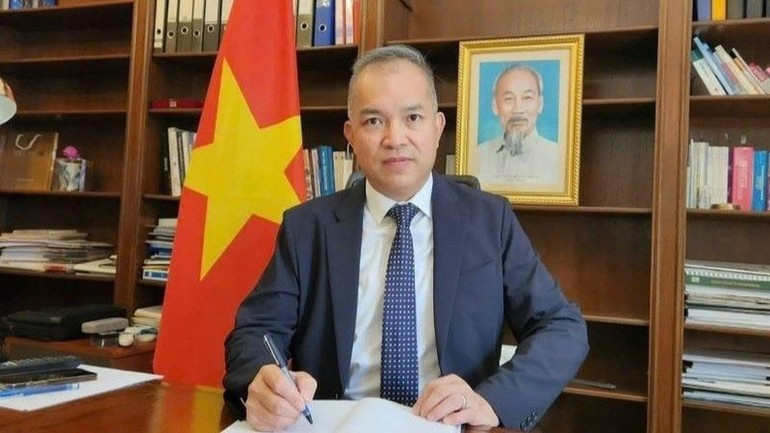
“The highlight of the visit will be Prime Minister Pham Minh Chinh’s policy speech at the Kuwait Diplomatic Institute — a prestigious institution for diplomatic training and academic exchange that plays an important role in cultivating human resources for Kuwait’s foreign service in the Arab region and globally. Through the speech, the prime minister will convey strong messages on Viet Nam’s steady progress in socio-economic development, while highlighting Viet Nam’s orientations, policies, and priorities in strengthening multi-faceted cooperation with the Middle East region and Kuwait in particular within a long-term strategic vision,” Ambassador Nguyen Duc Thang stressed.
Investment and trade are the bright spots in current Viet Nam–Kuwait relations
Discussing cooperation potential between Viet Nam and Kuwait, Ambassador Nguyen Duc Thang said Kuwait occupies a strategically important position in the Arab Gulf, acting as a vital link in global energy transportation routes. Kuwait’s oil reserves are currently the sixth largest in the world, at 101.5 billion barrels, and its daily oil production ranks tenth globally.
Kuwait has recently discovered additional offshore oil and gas fields, creating major prospects for sustaining development of its key industry and maintaining its position as one of the world’s leading oil exporters. Notably, the Kuwait Investment Authority (KIA) manages the world’s fourth largest sovereign wealth fund, valued at around 1.065 trillion USD (after Norway, China, and the UAE), serving as an important vehicle for outward investment.
From these advantages, investment and trade have become the most prominent aspects of current Viet Nam–Kuwait relations. Kuwait is the Middle Eastern country with the largest total investment in Viet Nam to date, most notably its 3.5 billion USD equity contribution to the Nghi Son Refinery and Petrochemical Complex.
In trade, bilateral turnover in 2024 reached 7.3 billion USD — the highest figure recorded between Viet Nam and any Middle Eastern country to date (in the first nine months of 2025 alone, the figure has exceeded 5 billion USD). Large-scale oil imports from Kuwait ensure stable supply for the Nghi Son Refinery, which provides more than 35% of the petrol and oil consumed in Viet Nam’s domestic market. Meanwhile, Viet Nam’s exports to Kuwait have become increasingly diversified and of higher value, including agricultural and aquatic products, fruit, wooden goods, machinery, and electronic products.
In addition, the two countries maintain cooperation in other areas. The Kuwait Fund has long supported essential infrastructure projects in Viet Nam, with total assistance reaching 182 million USD through 15 projects across various provinces.
In local-to-local cooperation, several partnership agreements have been established, such as between Ho Chi Minh City and Ahmadi Province, and between Thanh Hoa Province and Farwaniya Province, contributing to delegation exchanges, trade promotion, and people-to-people engagement.
In education and training, the Kuwaiti government has offered a number of scholarships each year since 2013 for Vietnamese students to study Arabic at Kuwait University.
According to Ambassador Nguyen Duc Thang, in addition to traditional areas of cooperation, Viet Nam and Kuwait have ample room to expand collaboration in high-potential fields. For instance, oil and energy cooperation can be broadened. Viet Nam has favourable conditions to become the largest oil storage and distribution centre in Southeast Asia.
At the same time, as the world transitions strongly towards renewable energy, Viet Nam and Kuwait have significant potential for cooperation in green and clean energy, contributing to each country’s international commitments. Both countries can jointly study and invest in solar power, wind power, and green hydrogen projects — combining Kuwait’s financial strength with Viet Nam’s production and technical capabilities.
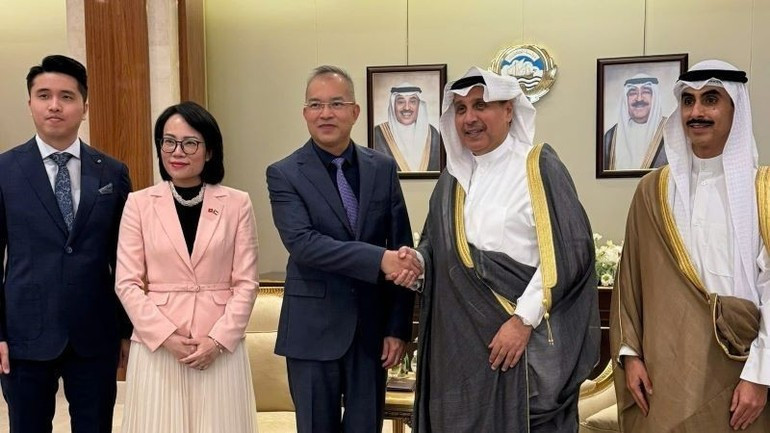
Moreover, with its dynamic economy and attractive investment climate, Viet Nam hopes to attract greater attention from Kuwaiti investment funds. In the coming period, the two countries can promote major joint projects to help establish new financial hubs in the region. Viet Nam can become a gateway for Kuwait to expand into Southeast Asia, while Kuwait can serve as a strategic partner supporting Viet Nam’s access to the Middle Eastern and neighbouring markets.
As one of the world’s leading exporters of agricultural and aquatic products, Viet Nam can guarantee food security and supply diverse, stable, and long-term Halal-standard products for Kuwait. Cooperation in this field will not only help Kuwait diversify its food supply but also enable Viet Nam to develop Halal agricultural value chains and expand exports to the GCC and broader Middle East region.
Viet Nam is an increasingly popular destination for international tourists, including Kuwait citizens, who view travel as an essential part of life. With high incomes, Kuwait’s annual tourism spending has remained stable at 12–13 billion USD in recent years. Many Kuwaiti families and entrepreneurs have chosen Viet Nam for leisure and discovering nature, cuisine, and East Asian culture. International arrivals to Viet Nam may exceed 22 million in 2025, up 20% compared to the previous year, with contributions from tourists from Muslim-majority countries. In the future, the two sides can promote direct flights and increase tourism promotion programmes.
Viet Nam and Kuwait also maintain a tradition of mutual support at international forums, including important United Nations bodies where both sides serve as members. In a world of increasing volatility, coordination between Viet Nam and Kuwait in promoting multilateralism, peace, sustainable development, and active participation in humanitarian missions will further elevate both countries' roles internationally. More importantly, both countries are well positioned to act as bridges strengthening cooperation between ASEAN and the GCC in both political and economic dimensions, establishing a promising trajectory for inter-regional linkage.
Continuing to nurture Viet Nam–Kuwait relations and creating momentum for a new phase of cooperation
According to Ambassador Nguyen Duc Thang, alongside achievements in many fields over half a century of diplomatic relations, the friendship between Viet Nam and Kuwait needs to be further fostered, requiring effort from both sides.
“Based on the outcomes of Prime Minister Pham Minh Chinh’s official visit to Kuwait in November 2025, and as the two countries mark the 50th anniversary of diplomatic ties in January 2026, Viet Nam–Kuwait relations are now placed within a higher and broader framework, demanding effort from both sides. Accordingly, Viet Nam needs to prioritise practical and effective measures to create momentum for a new phase of cooperation,” Ambassador Nguyen Duc Thang emphasised.

First, it is necessary to promptly implement the outcomes and commitments reached during the prime minister’s official visit to Kuwait in November 2025. Action plans for each field of cooperation should be developed swiftly with a long-term strategic vision to leverage each country’s potentials and advantages. Priority areas include oil and energy, investment, food security, digital transformation, civil infrastructure, and tourism.
At the same time, Viet Nam needs to demonstrate greater proactiveness in expanding cooperation with Kuwait and adopt a comprehensive approach to the GCC region — both unified and tailored to each country. At the regional level, Viet Nam needs to implement coordinated policies for the GCC as a whole through investment promotion, an FTA, Halal standards, carbon credits, and the digital economy. For Kuwait specifically, Viet Nam should adjust flexibly according to its geographical characteristics, population size, financial investment methods, food security needs, infrastructure development, and tourism demands, thereby maximising mutual benefits and affirming Viet Nam’s position as a reliable and sustainable partner.
In addition, Viet Nam should fully utilise or upgrade existing cooperation mechanisms and ensure effective implementation of bilateral agreements already signed in multiple fields. Meetings of the intergovernmental committee on economic, trade, scientific and technical cooperation; political consultations between the two ministries of foreign affairs; and exchanges between ministries, sectors, and localities should be maintained in a more regular and substantive manner. Through periodic meetings, both sides can review and assess implementation progress and promptly address any arising challenges. In practice, Kuwaiti culture values direct engagement and cordial personal relations, which form the foundation for long-lasting cooperation.
According to Ambassador Nguyen Duc Thang, the political commitment between the two countries, coupled with close and coordinated efforts across all levels, will be key in enabling Viet Nam and Kuwait to overcome differences, seize opportunities, and harness their respective potentials, thereby bringing bilateral relations into a new chapter of more comprehensive and sustainable development.
